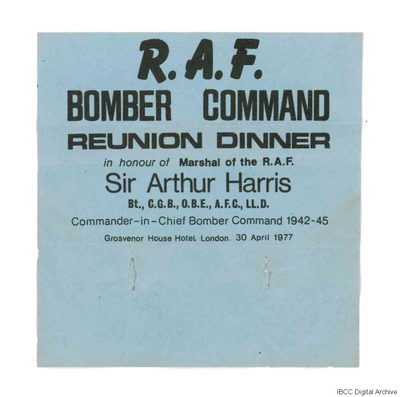Bomber Command reunion dinner
Title
Bomber Command reunion dinner
Description
Arthur Harris speaks about the reduction of frontline soldiers available to the Germany army due to the redirection of men to anti aircraft defences and repairs to the German armament industry as a result of bombing by the RAF and the 8th USAAF. He describes the importance of the cutting of the supply lines to the Germany army in the Battle of the Ardennes, the mass bombing of the Channel ports in support of allied troops, minelaying operations and targeting of the Mittelland and Dortmund Ems canals to restrict transportation of prefabricated submarine parts. In his speech he references various sources including President Eisenhower and the German Minister of Armaments, Albert Speer.
Card giving details of the RAF Bomber Command reunion dinner at Grosvenor House Hotel, London.
Card giving details of the RAF Bomber Command reunion dinner at Grosvenor House Hotel, London.
Date
1977-04-30
Spatial Coverage
Language
Format
00:47:03 audio recording
Conforms To
Publisher
Rights
This content is available under a CC BY-NC 4.0 International license (Creative Commons Attribution-NonCommercial 4.0). It has been published ‘as is’ and may contain inaccuracies or culturally inappropriate references that do not necessarily reflect the official policy or position of the University of Lincoln or the International Bomber Command Centre. For more information, visit https://creativecommons.org/licenses/by-nc/4.0/ and https://ibccdigitalarchive.lincoln.ac.uk/omeka/legal.
Identifier
AMuhlTG19770430-0002, AMuhlTG19770430-0001
Collection
Citation
“Bomber Command reunion dinner,” IBCC Digital Archive, accessed October 18, 2024, https://ibccdigitalarchive.lincoln.ac.uk/omeka/collections/document/50370.
Item Relations
This item has no relations.

